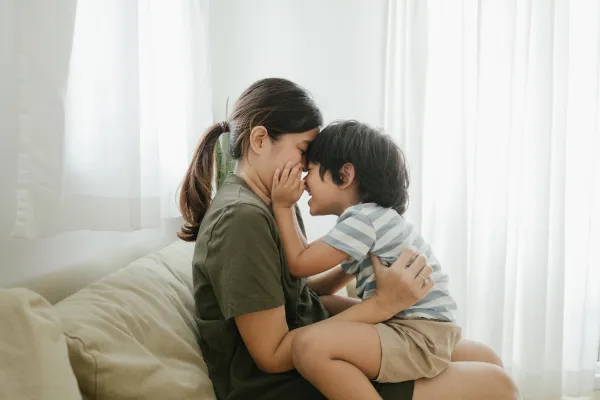Blog
Blog

7 Life-Changing Benefits of Mindful Parenting
Parenting is one of the most rewarding yet challenging journeys we can embark on. Between the chaos of daily routines, endless to-do lists, and the emotional ups and downs of raising children, it’s easy to get lost in the noise. That’s where mindful parenting comes in.
Mindful parenting isn’t about being perfect. It’s about being present. It’s the practice of slowing down, tuning in, and responding to your child with awareness and compassion rather than reacting on autopilot. The benefits extend far beyond just improving your relationship with your child. Mindful parenting can transform your entire family dynamic, bringing more patience, connection, and happiness into your everyday life.
Here are seven powerful benefits of mindful parenting and why it’s worth incorporating into your routine.
1. Mindfulness Strengthens Your Connection With Your Child
One of the greatest gifts of mindful parenting is the deep, meaningful connection it fosters between you and your child. When you’re fully present, truly listening, engaging, and responding without distraction - your child will feel seen, heard, and valued.
Children thrive when they feel connected to their parents. They’re more likely to open up, express themselves freely, and develop a secure sense of trust. When you practice mindful parenting, you show your child that they matter - not just when it’s convenient, but always.
Try this: Next time your child talks to you, put away your phone, make eye contact, and focus entirely on them. Even a few minutes of undivided attention can make a world of difference.
2. Mindfulness Reduces Stress and Overwhelm
Parenting can be overwhelming. The constant juggling of responsibilities, the pressure to do everything “right,” and the never-ending mental load can leave you feeling exhausted.
Mindful parenting helps you step back from the stress. By practicing deep breathing, staying present, and letting go of unnecessary worries, you create space for calm in the midst of chaos. You learn to respond to challenges with intention rather than reacting out of frustration, which reduces stress for both you and your child.
Try this: When you feel overwhelmed, take a deep breath in through your nose for four counts, hold for four counts, and exhale slowly for four counts. A few mindful breaths can instantly shift your energy.
3. Mindfulness Encourages Emotional Regulation - For Both You and Your Child
Children look to us to learn how to navigate emotions. If we react impulsively to frustration, they learn to do the same. But when we model mindfulness - pausing before responding, acknowledging emotions without judgement, and choosing calm over chaos, we teach them invaluable emotional regulation skills.
Mindful parenting helps you recognize and manage your own emotions so you can guide your child through theirs. Instead of snapping when your child is having a meltdown, you learn to approach the situation with patience and empathy, helping them feel safe and supported.
Try this: The next time your child is having a big emotional reaction, take a moment before responding. Validate their feelings by saying something like, “I see that you’re really upset right now”, before helping them find a solution.
4. Mindfulness Creates a More Peaceful Home Environment
Tension in the home often stems from reactive parenting - raising voices, making demands, and feeling like you’re constantly putting out fires. When you parent mindfully, you bring a sense of calm into your household. You become more intentional with your words and actions, which helps diffuse power struggles and unnecessary conflicts.
When children are raised in a mindful, peaceful environment, they naturally become more cooperative and resilient. A home filled with patience, respect, and emotional awareness fosters a deep sense of security for the entire family.
Try this: Set the tone for a peaceful home by starting each morning with a moment of mindfulness - whether it’s a quiet cup of tea, a deep breath before waking your children (if they aren't early risers!), or simply setting an intention for the day.
5. Mindfulness Increases Your Child’s Self-Confidence
When children feel heard and understood, their self-esteem flourishes. Mindful parenting teaches you to validate your child’s feelings, acknowledge their efforts, and celebrate their individuality. Instead of dismissing their emotions or rushing to fix problems, you empower them to express themselves and navigate challenges with confidence.
A child who grows up feeling valued and respected learns to trust themselves and their abilities. They develop a strong sense of self-worth, which carries into adulthood.
Try this: When your child accomplishes something (big or small), acknowledge their effort rather than just the result. Say, “I noticed how hard you worked on that!” instead of just “Good job!”

6. Mindfulness Helps You Enjoy Parenting More
Often we get caught up in the daily grind that we forget to actually enjoy parenthood. Mindful parenting shifts your focus from constantly “managing” your child to truly experiencing them. It reminds you to slow down, savour the little moments, and appreciate the magic in everyday life.
When you’re mindful, you’re more likely to notice that warm feeling when your child laughs, the curiosity in their eyes, and the joy in simply being together. These moments, as small as they may seem, are what make parenthood so meaningful.
Try this: At the end of each day, reflect on one special moment you shared with your child. It could be a funny conversation, a quiet cuddle, or a moment of discovery. Let yourself fully appreciate it.
7. Mindful Parenting Teaches Lifelong Skills
When you practice mindfulness as a parent, you’re not just benefiting yourself - you’re shaping the way your child approaches life. Children raised in mindful households learn to manage stress, regulate emotions, and navigate relationships with greater awareness and compassion.
By leading with mindfulness, you equip your child with the tools to handle life’s challenges with grace. You teach them that presence is more valuable than perfection and that inner peace is something they can cultivate at any time.
Try this: Introduce mindfulness to your child by practicing simple breathing exercises together or taking a few moments to observe nature during a walk. Show them that mindfulness is a tool they can use anytime, anywhere.
Final Thoughts
Mindful parenting isn’t about eliminating challenges. It’s about approaching them with greater awareness, patience, and love. The more present you are, the more connected you feel to your child and the parenting journey as a whole.
You don’t have to be mindful every second of the day. Even small moments of mindfulness (pausing before reacting, truly listening, or simply taking a deep breath) can have a profound impact.
Parenting is a journey, and mindful parenting helps you embrace it with more joy, intention, and love. So take a deep breath, be present, and enjoy the ride. ❤️

